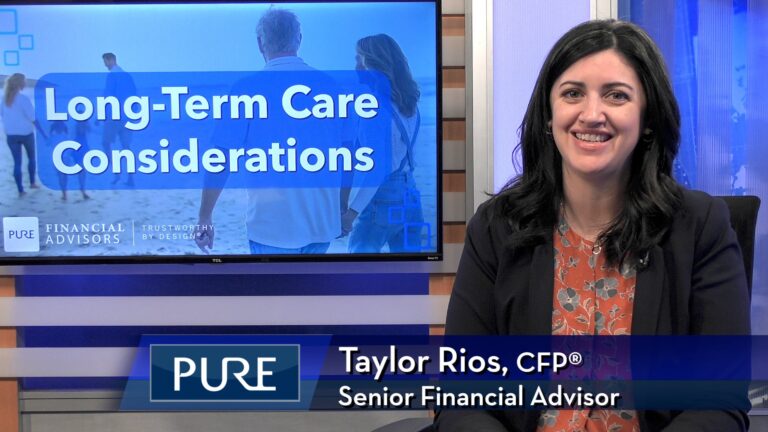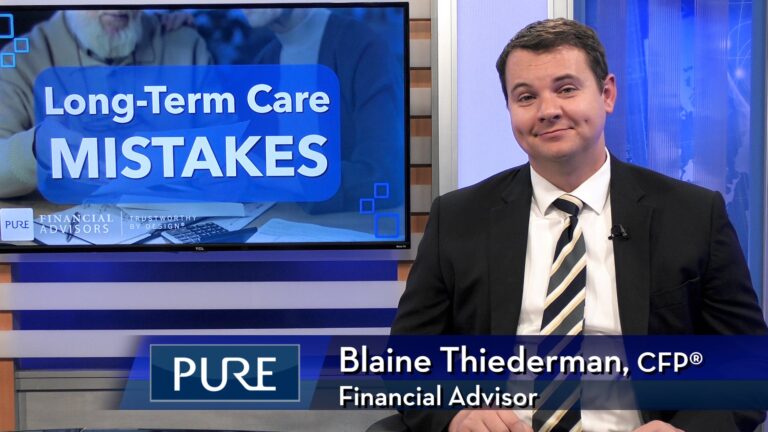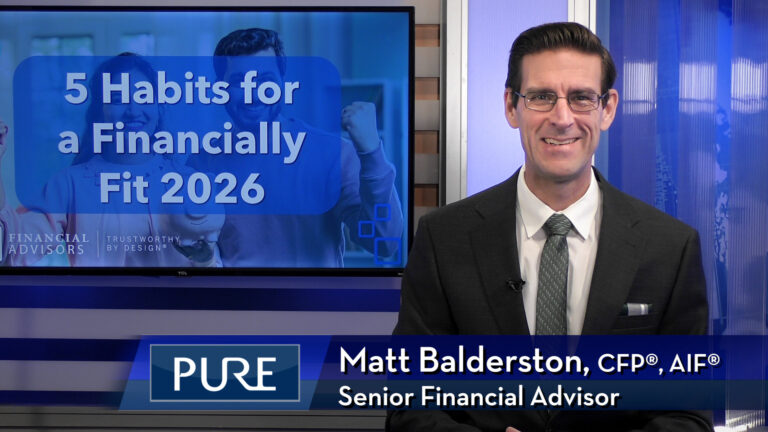Are you equipped with the insights needed to meet your financial goals for the new year? Pure’s Financial Planner, Michael Chipperfield, CFP®, AIF®, reviews five helpful tips to pave the way to success in 2024.
- Build an Emergency Fund
- Plan to Pay Off High Interest Debt
- Track Your Expenses
- Increase Retirement Savings
- Revisit Investment Strategy
FREE GUIDE | Financial New Year’s Resolutions Guide
Transcript
The new year is a great time to set some goals. Here are five that will help you through this year and beyond.
Build an Emergency Fund
First, make it a priority to build an emergency fund. An emergency fund is a savings account specifically designated for the unexpected expenses such as job loss, medical bills, or any other unplanned expenses. As a rule of thumb, it is recommended that you save 6-12 months of your living expenses in your emergency fund. The amount you decide you save is ultimately going to come down to personal comfort level as some people prefer to have more of a cushion than others.
Plan to Pay Off High Interest Debt
Next, come up with a plan to payoff high interest debt. Paying down high interest rate debt can amount to significant savings in the long run. Especially given the rising interest rate environment we’ve been in for over the last year, interest on debt such as credit cards can start to compound and can greatly impact your ability to save. If possible, consider consolidating your debt into one loan with a lower interest rate, this can help you get the total balance paid off quicker.
Track Your Expenses
Goal number three should be to track your expenses. Tracking where your money goes is the first step to identifying areas where you can cut back or change your spending habits. Once you’ve identified places you can slim your expenses, you’ll be able to build your savings or paydown that debt that much quicker.
Increase Retirement Savings
A very important goal should be to increase your retirement savings. The IRS limits for retirement account savings are all receiving an increase going into the new year so it is important to evaluate your savings strategy to determine how much you can save and what accounts those contributions will go to. Saving for big goals such as retirement can often feel daunting, but remember that with the power of compound interest, even small contributions to a retirement account can add up over time.
Revisit Investment Strategy
Finally, now is a great time to revisit your investment strategy and consider if you should make any changes. Often times, investors choose investments in the 401k and retirement plans once, and then don’t review those decisions until they are thinking about retirement. Remember that your investment strategy should reflect the stage of life and goals you are trying to achieve, so this often means reviewing your approach on a regular basis.
If you’d like help in achieving these goals take advantage of our free financial assessment.
Subscribe to our YouTube channel.
IMPORTANT DISCLOSURES:
• Investment Advisory and Financial Planning Services are offered through Pure Financial Advisors, LLC, a Registered Investment Advisor.
• Pure Financial Advisors LLC does not offer tax or legal advice. Consult with your tax advisor or attorney regarding specific situations.
• Opinions expressed are subject to change without notice and are not intended as investment advice or to predict future performance.
• Investing involves risk including the potential loss of principal. No investment strategy can guarantee a profit or protect against loss in periods of declining values.
• All information is believed to be from reliable sources; however, we make no representation as to its completeness or accuracy.
• Intended for educational purposes only and are not intended as individualized advice or a guarantee that you will achieve a desired result. Before implementing any strategies discussed you should consult your tax and financial advisors.
CFP® – The CERTIFIED FINANCIAL PLANNER™ certification is by the Certified Financial Planner Board of Standards, Inc. To attain the right to use the CFP® designation, an individual must satisfactorily fulfill education, experience and ethics requirements as well as pass a comprehensive exam. Thirty hours of continuing education is required every two years to maintain the designation.
AIF® – Accredited Investment Fiduciary designation is administered by the Center for Fiduciary Studies fi360. To receive the AIF Designation, an individual must meet prerequisite criteria, complete a training program, and pass a comprehensive examination. Six hours of continuing education is required annually to maintain the designation.












